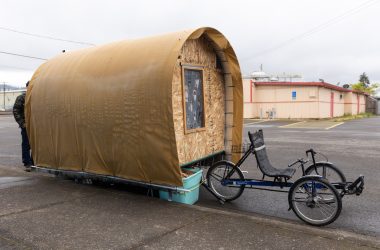 PHOTO BY EMMA ROUTLEY/THE CHRONICLE … Air quality is at dangerous levels in the southern Willamette Valley.
PHOTO BY EMMA ROUTLEY/THE CHRONICLE … Air quality is at dangerous levels in the southern Willamette Valley.
The direction from area medical experts could not be clearer: Stay indoors as much as possible. And if you must go out, make it brief and wear a high-quality mask.
“The most important piece of advice is to stay inside … the most you can. Absolutely do not go out unless you have to,” said Carol Hardisty, a 25-year respiratory therapist and certified asthma education leader with PeaceHealth Cottage Grove Community Medical Center. “And if you do go out, wear a mask.” In fact, “make sure you have spare masks and extra masks so you have a permeable, breathable mask,” she said, referring to the ash flakes and smoke in the air.
Dr. Leslie Pelinka, a pediatrician with PeaceHealth, reiterated the importance of staying indoors when air quality levels are low.
“Poor air quality is a risk, especially to those with chronic respiratory or breathing conditions. If at all possible, stay inside,” she said. “During these days when the air quality is what it is here, stay indoors.”
Residents can monitor the Air Quality Index on various websites, including Lane Regional Air Protection Agency (lrapa.org) and airnow.gov. From the airnow website:
“Think of the AQI as a yardstick that runs from 0 to 500. The higher the AQI value, the greater the level of air pollution and the greater the health concern. For example, an AQI value of 50 or below represents good air quality, while an AQI value over 300 represents hazardous air quality.”
The AQI for Cottage Grove on Wednesday morning was 369 and rated “Hazardous.” The Springfield/Eugene area was at 283 and listed as “Very Unhealthy.”
Both medical professionals stressed that when air quality is especially poor, it’s even more important to have an N95-quality mask. They also remind the general public that professional healthcare workers are still in need of personal protection equipment, too. A quick trip to the store might not require the same level of mask, Pelinka said.
Hardisty and Pelinka pointed out poor air quality is an added danger for those with respiratory special needs. “People with COPD, asthma and even children who have special needs, such as premature babies whose lungs aren’t completely developed – anyone with respiratory conditions needs to be on high alert,” Hardisty said. “If you’re taking prescribed medications, stay on top of things; if it looks like you’re using rescue inhalers and medications more and more, check in with physicians.”
She also noted the importance of staying hydrated. “It’s key … it is important to breathe through your nose because it’s a filtration and humidification system. Try to avoid breathing through your mouth.”
Pelinka said it’s important to keep children inside on days with poor air quality – even for short bursts outside. Letting stay-at-home students outside to run around and burn off energy is a “hard no,” she said.
“This is not the time for that … not on days with poor air quality.”
Pelinka had one other piece of advice for people encountering health issues due to the smoke: Call your doctor.
“If you’ve been seeing a doctor about respiratory issues, use medicines as instructed. If you don’t quite know what to do, call a medical professional. We expect a high volume of calls from patients on days like these. Communicate with your doctor.”








